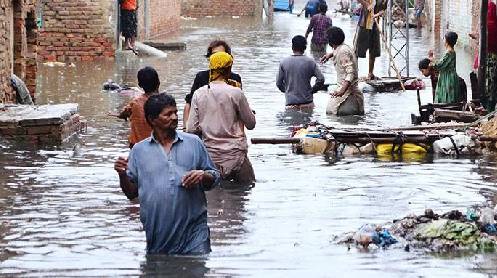The threat of climate change exacerbates existing vulnerabilities within Pakistan, amplifying risks to livelihoods, food security, and water resources.
The World Bank has sounded the alarm, highlighting Pakistan’s acute vulnerability to the ravages of climate change. In a recent report titled “Second Resilient Institutions for Sustainable Economy: Climate Change Technical Note,” the global financial institution underscored that the South Asian nation faces frequent fiscal shocks due to extreme weather events. The threat of climate change exacerbates existing vulnerabilities within Pakistan, amplifying risks to livelihoods, food security, and water resources.
Around 49 million people in Pakistan are at risk of a 4-5% decline in quality of life by 2030 due to climatic shocks, causing loss of life, economic damage, and setbacks in development efforts over the past 15 years, as per the report.
One of the most pressing concerns highlighted by the World Bank is the increased intensity and frequency of floods, which have caused substantial physical damage affecting over 30 million people since 2010.
The resulting damages and losses have exceeded a staggering $14 billion. Additionally, Pakistan is becoming increasingly exposed to various other climate-related hazards such as droughts, heatwaves, and cyclones, further exacerbating the challenges faced by households and posing significant fiscal sustainability issues for the country.
In response to these challenges, the +has propos3
2ed two prior actions aimed at generating climate co-benefits. The first action targets the reduction of fiscal costs associated with power subsidies.
The bank reported that the Pakistani government has approved a second phase of subsidy reforms for domestic consumers, including reductions in subsidies for users consuming above 200 kWh/month for six consecutive months, as well as the elimination of incremental block tariff benefits. Moreover, the Ministry of Energy has notified electricity distribution companies to increase tariffs for users consuming above 200 kWh/month for six consecutive months in the fiscal year 2023.
Highlighting the economic implications of climate challenges, the World Bank pointed out that inefficiencies across Pakistan’s energy sector, driven by large distortive energy subsidies, are contributing to significant fiscal deficits and accumulating power sector debt, known as the “circular debt.”
To address these inefficiencies, the bank recommended politically difficult reforms, including tariff reforms in the electricity sector, which are expected to have positive environmental impacts by reducing subsidies for most residential consumers and mitigating excessive energy use.
The second prior action proposed by the World Bank aims to promote the widespread adoption of digital payments. The State Bank of Pakistan has already launched the Pakistan instant payment system, increased acceptance infrastructure for digital payments, and revised the Foreign Exchange Manual to facilitate investments. Additionally, the Finance Division has amended Treasury Rules to allow the use of digital payments to vendors.
The World Bank highlighted the importance of digital payments in disaster management, citing successful deployment during the 2010 floods to provide swift and transparent compensation to affected populations. With the new digital payment system, the entire banking sector can be leveraged to rapidly deploy aid payments, even in areas that may become physically inaccessible during climatic shocks or natural disasters.
As Pakistan grapples with the looming threats posed by climate change, the World Bank’s recommendations underscore the urgent need for coordinated action to mitigate risks, build resilience, and safeguard the well-being of the population.







